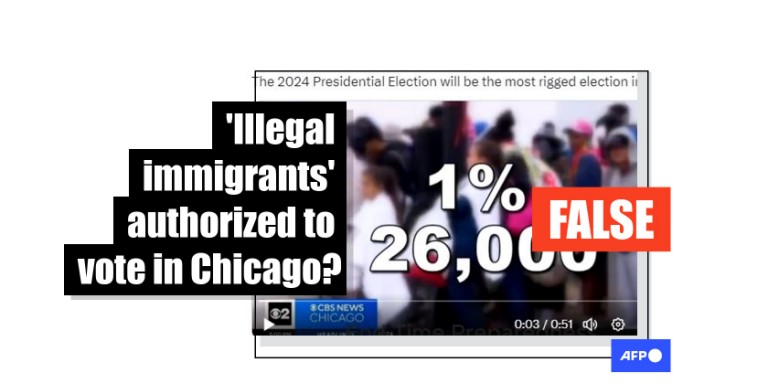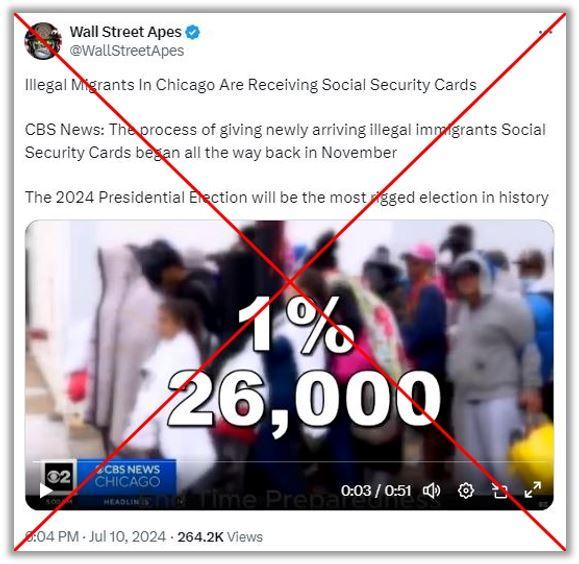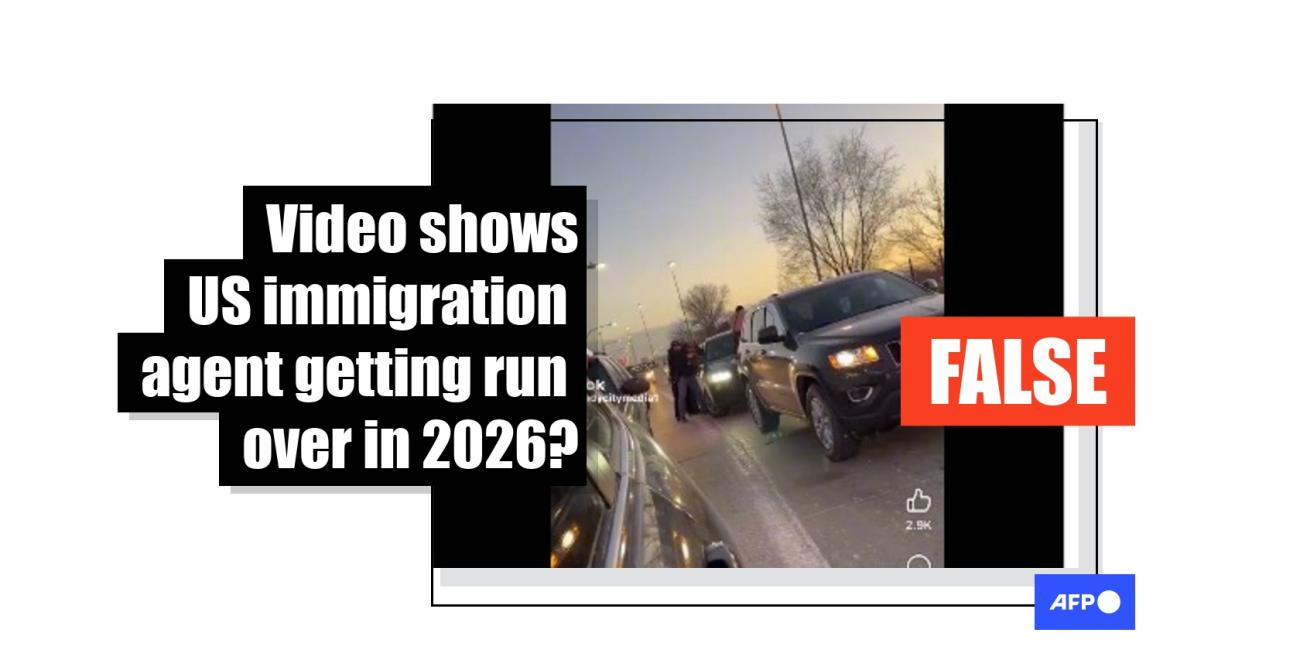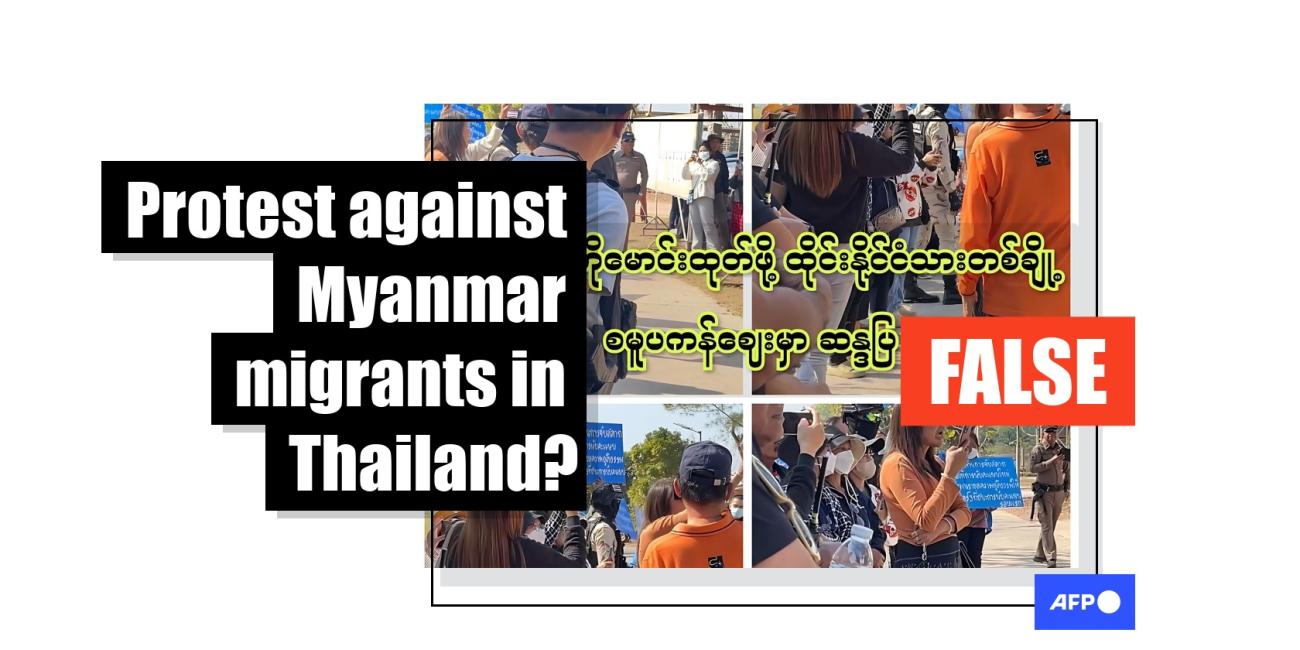
Misinformation about undocumented migrants, Social Security stokes voter fraud concerns
- This article is more than one year old.
- Published on August 1, 2024 at 20:58
- 4 min read
- By Nahiara S. ALONSO, AFP USA
- Translation and adaptation Natalie WADE
"Illegal Migrants In Chicago Are Receiving Social Security Cards," says a July 10, 2024 X post with thousands of interactions.
"CBS News: The process of giving newly arriving illegal immigrants Social Security Cards began all the way back in November. The 2024 Presidential Election will be the most rigged election in history."
The post, which includes a clip from a CBS News broadcast, comes from an account called "Wall Street Apes," which AFP has previously fact-checked for spreading misinformation.

Similar posts have circulated elsewhere on X, including in Spanish.
Concerns about undocumented immigrants voting in the 2024 election have inundated social media since immigration emerged as a key issue in the race between former US president Donald Trump and Vice President Kamala Harris. Republicans have criticized the Democratic presidential candidate for her role in the Biden administration's handling of the record surge of crossings at the US-Mexico border.
AFP has previously debunked claims that Democrats are "importing voters" in a plot to rig results. The recent posts are the latest example of that misinformation trend.
CBS News published the full broadcast segment on January 1, 2024 (archived here) focused on asylum seekers. The network reported that "about one percent of the more than 26,000 migrants who arrived in Chicago since August 2022" received work permits and Social Security cards, amounting to approximately 260 people.
Noncitizens who lawfully live in or are authorized to work in the United States can receive a Social Security number (SSN) (archived here), making undocumented immigrants ineligible. They also would not qualify for an Employment Authorization Document, which is available to migrants with a pending status application or asylum seekers (archived here).
Joshua Rodriguez, manager of federal advocacy and policy at the Immigration Hub, which lobbies for immigrant rights, said July 22 that asylum seekers can obtain Social Security numbers "only if they have received work authorization from the US Department of Homeland Security" (archived here and here).
When they do, the records will clearly indicate that they are "non-citizens," according to Kenneth Mayer, a professor of American politics at the University of Wisconsin-Madison (archived here).
Who can vote?
US voters must be citizens, 18 or older and meet state residency requirements to cast ballots in federal elections (archived here).
Some municipalities in California, Maryland and Vermont, as well as the District of Columbia, have passed laws allowing non-citizens to vote in local polls (archived here).
But David Becker, executive director and founder of the nonprofit Center for Election Innovation and Research (archived here), said "it is illegal for non-citizens to vote in federal elections" (archived here).
"It has been since at least 1996, when Congress passed a bipartisan law," he said July 18.
The Illegal Immigration Reform and Immigration Responsibility Act bars non-citizens, including permanent residents with green cards, from voting in federal elections. Violating the law could result in fines, prison sentences and deportation (archived here and here).
"Virtually no non-citizen would risk deportation for the right to cast a single ballot in an election in which 160 million votes will be cast," Becker said, adding that "states have the tools to prevent and detect noncitizen voting and registration."
Voter identification
The National Voter Registration Act of 1993 (archived here) requires all states to use a common form on which prospective voters in federal elections must attest under penalty of perjury that they are US citizens.
"All registrants must provide identification to register to vote in federal elections," Becker said.
This can be a photo ID, utility bill, bank statement, paycheck or government-issued document that shows one's name and address (archived here).
Becker said most people provide a driver's license or state identification number, which officials check against state motor vehicle records.
"Thanks to REAL ID, every state must collect documentation of legal presence when providing ID, and that ID is checked against that data," he said. "The Social Security Administration has similar data, if a voter chooses to provide an SSN instead."
Illegal voting is rare
Evidence of non-citizen voting is sparse (archived here and here):
- A 2016 review from the nonprofit Brennan Center for Justice found only 30 suspected cases out of 23.5 million votes cast in that year's presidential election (archived here).
- A 2022 Georgia audit found fewer than 1,700 cases of non-citizens who attempted to register to vote over the past 25 years -- none of whom were permitted to cast a ballot (archived here).
- A database from the conservative Heritage Foundation analyzing legal actions related to elections shows some two dozen instances of non-citizen voting between 2003 and 2023 (archived here).
"Study after study (and many lawsuits filed by former President Trump that were dismissed for lack of evidence) show that non-citizens are not voting, except in extremely rare cases, primarily when an immigrant inadvertently registers and slips through the cracks," said Ron Hayduk, a political science professor at San Francisco State University (archived here), on July 16, 2024.
He added that false claims on social media "fuel fear and justify the imposition of severe voting restrictions."
Read more of AFP's reporting on misinformation about the 2024 US election here.
Copyright © AFP 2017-2026. Any commercial use of this content requires a subscription. Click here to find out more.
Is there content that you would like AFP to fact-check? Get in touch.
Contact us




